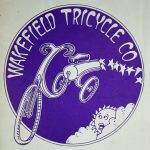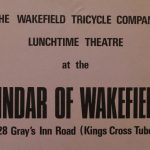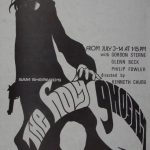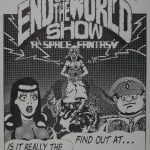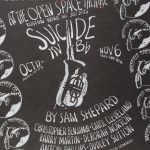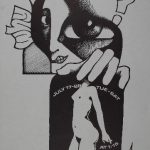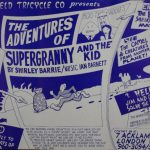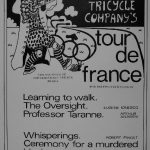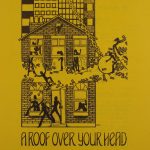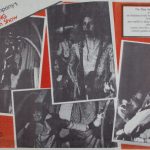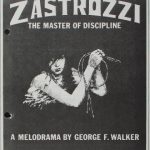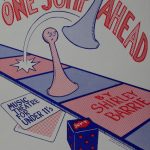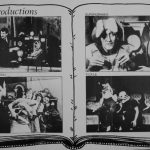Company name: Wakefield Tricycle Company
Founders: Shirley Barrie, Kenneth Chubb and Martin Cook
Established: 1972
Reason: For the founders and their associates to perform lunchtime shows at the Pindar of Wakefield pub
Current status: Continues to operate – as the Tricycle Theatre
Area of Work: New Writing
Policy: To produce new writing by performing plays that were new to London and/or the UK, and to commission new work
Structure: Hierarchical structure, with Kenneth Chubb as Artistic Director, and Shirley Barrie, later Martin Cook, as Administrator. For a brief time Madhav Sharma acted as co-Artistic Director with Chubb from 1977-78.
Based: Started in a room at the Pindar of Wakefield pub, near Kings Cross, in the London Borough of Camden. The company went on to be active in several other London boroughs, including Brent, Lambeth, Islington and Kensington. It also toured outside London, predominantly in the South East, although sometimes further afield. The company sought a permanent space under the Westway in West Kensington during the mid 1970s, without success. However, in the late 1970s plans were developed and funding approved for a fixed base on the Kilburn High Road in Brent, and the resulting Tricycle Theatre opened in 1980. The company continued to tour productions only occasionally after 198o, but the Tricycle Theatre itself become a receiving house for a number of other alternative theatre companies.
Funding: Arts Council of Great Britain
Performance venues: Performed at a variety of small theatres, community centres, prisons and schools across London and the South East. Venues include the Pindar of Wakefield pub, Bush Theatre, Soho Poly, Brixton Prison, Kings Head, Africa Centre, ICA, Saffron Lane Community Project, Old House Community Centre, The Drill Hall, Oval House and the Open Space.
Audiences: Mixed audiences, consisting of regular theatre-going crowds for the company’s new writing productions, and often diverse audiences for its community theatre. The company also performed plays to young people, in schools and community centres.
Company work and process: The Wakefield Tricycle Company was formed by Canadian expats Kenneth Chubb and Shirley Barrie, initially performing short esoteric plays to lunchtime audiences at the Pindar of Wakefield pub, from which the company took its name. The company’s early productions brought new work to London, prominently plays by American playwright Sam Shepard (relatively unknown in the UK at the time), and the London based John Antrobus. Their repertoire at this stage featured a strong trend in French Absurdist plays and an ambition to bring new writing and theatrical forms and expression to London audiences.
Personal appraisal & thoughts:
To hear about how they started and named the company, see this clip of an interview with Shirley Barrie and Kenneth Chubb, conducted in 2010.
On fitting into the alternative theatre scene in London in the early 1970s
Shirley Barrie: ‘It was a very, very vibrant time theatrically. It was a pretty exciting time. When we started we decided that we would do, within two weeks… we decided that we would do plays that hadn’t been seen in London before, that was why [we did] Sam Shepard, we did a series of French plays, a lot of plays from Canada, France. We did some Arabal and Ionesco. That was to distinguish ourselves. That was just when new work was starting to really burgeon in England too. There were a lot of new writers, people were doing new work, so we were initially doing work that was new to London, and that whole first season, that’s what we did. It was just a really exciting time, and England was very expansive at that time. London, was very expansive at that time.’
On costs and funding
Ken Chubb: ‘Although it was expansive, it wasn’t expensive and I think a lot of us got started just because it was still fairly cheap to live in, and like the Publican at the Pindar, you could do deals and it wasn’t costing you very much. The actors would work for nothing. But fairly quickly after that, there were moves on the part of Equity to unionise the area, there was a much more serious attempt to fund it – the Arts Council were coming to you, rather than you going to them, which was unheard of. That was all very exciting. But it did mean that there were times when things shrank. So it had an expansive time, and then a shrinkage, when it was much harder for new companies to start. And certainly in the 80s, when Margaret Thatcher was in power, it was brutal. There were a number of theatres that were our contemporaries that just stopped, that will never be seen again. We’re very pleased that the Tricycle has stayed strong through it all.’
Reviews:
Productions:
| PRODUCTION | VENUES | DATES |
|---|---|---|
| Red Cross Writer: Sam Shepard Director: Kenneth Chubb | Pindar of Wakefield | 1972 |
| Architruc Writer: Robert Pinget Director: Kenneth Chubb | Pindar of Wakefield | 1972 |
| Orison Writer: Fernando Arrabal Director: Kenneth Chubb | Pindar of Wakefield | 1972 |
| Score Writer: Lyndon Brook Director: Kenneth Chubb | Pindar of Wakefield | 1972 |
| The Lesson Writer: Eugene Ionesco Director: Kenneth Chubb | Pindar of Wakefield | 1972 |
| Cowboys No. 2 Writer: Sam Shepard Director: Kenneth Chubb | Pindar of Wakefield | 1972 |
| The White Whore and The Bit Player Writer: Tom Eyen Director: Kenneth Chubb | Pindar of Wakefield | 1972 |
| The Sonata and the Three Gentlemen, or, How to Speak Music Writer: Jean Tardieu Director: Kenneth Chubb | Pindar of Wakefield | 1972 |
| Mr. Me (A dialogue with a brilliant character) Writer: Jean Tardieu Director: Kenneth Chubb | Pindar of Wakefield | 1972 |
| The New Step Writer: Leonard Cohen Director: Kenneth Chubb | Pindar of Wakefield | 1972 |
| Listen Writer: Robert Creeley Director: Kenneth Chubb | Pindar of Wakefield | 1972 |
| Double Bill: Mr. Me and The Lesson Writer 1: Jean Tardieu Writer 2: Eugene Ionesco Director: Kenneth Chubb | Bush Theatre | 1972 |
| Cowboys No. 2 Writer: Sam Shepard Director: Kenneth Chubb | Bush Theatre | 1972 |
| The White Whore and the Bit Player Writer: Tom Eyen Director: Kenneth Chubb | Bush Theatre | 1972 |
| Learning to Walk Writer: Eugene Ionesco | 1973 | |
| The Oversight Writer: Eugene Ionesco | 1973 | |
| Professor Taranne Writer: Arthur Adamov | 1973 | |
| Whisperings Writer: Robert Pinget | 1973 | |
| Ceremony for a Murdered Black Writer: Fernando Arrabal Director: Kenneth Chubb | The Howff | 1973 |
| The Marriages Writer: William Trevor Director: Ben Rea | Kings Head | 1973 |
| The Enlightenment of the Strawberry Gardene Writer: Don Haworth Director: Walter Hall | Kings Head | 1973 |
| The Holy Ghostly Writer: Sam Shepard Director: Kenneth Chubb | Kings Head | 1973 |
| Why Bournemouth? Writer: John Antrobus Director: Kenneth Chubb | Kings Head | 1973 |
| Recital Writer: Tom Gallagher Director: Robert Kempton | Kings Head | 1973 |
| The Love Course Writer: A. R. Gurney, Jr. Director: Peter John | Kings Head | 1973 |
| Monologue Night Writer: Harold Pinter Director: Sam Walters | Kings Head | 1973 |
| Love Story Writer: Colin Bennett Director: Kenneth Chubb | Kings Head | 1973 |
| Sex, Cold Cans and a Coffin Writer: Chris Johnson Director: John Link | Kings Head | 1973 |
| Why Bournemouth? Writer: John Antrobus Director: Kenneth Chubb | Kings Head | 1973 |
| The Missing Links Writer: John Antrobus Directors: Kenneth Chubb and John Antrobus | Kings Head | 1973 |
| Stay Where You Are Writer: Olwen Wymark Director: Bernard Krichefski | Kings Head | 1973 |
| Paradise Gardens East Writer: Frank Gagliano | Kings Head | 1973 |
| How Sparks Learned to Fly Writer: Derek Smith Director: Kenneth Chubb | Kings Head | 1973 |
| Under the Bamboo Tree Writer: Tina Brown Director: Lysha Beard | Kings Head | 1973 |
| Triangle (a monologue) Writer: James Saunders Director: Kenneth Chubb | Kings Head | 1973 |
| The Dinosaurs Writer: John Antrobus Director: Kenneth Chubb | Soho Poly | 1974 |
| Certain Humiliations Writer: John Antrobus Director: Kenneth Chubb | Soho Poly | 1974 |
| An Evening with the GLC Writer: David Pinner | Soho Poly | 1974 |
| The Recorder Writer: Martin Duberman Director: Robert Gillespie | Soho Poly | 1974 |
| Botticelli Writer: Terrence McNally | Soho Poly | 1974 |
| The Illegal Immigrants, Certain Humiliations and The Dinosaurs Writer: John Antrobus Director: Kenneth Chubb | Soho Poly | 1974 |
| Certain Humiliations and The Dinosaurs Writer: John Antrobus Director: Kenneth Chubb | Festival of Cafe Theatre (Rennes, France) | 1974 |
| Old Man Aesop He Knew The Game Writer: Edwin N. Turner Director: Kenneth Chubb | Soho Poly | 1974 |
| The Athlete Writer: Derek Smith Director: Peter Stevenson | Soho Poly | 1974 |
| A Roof Over Your Head Writer: Derek Smith Director: Kenneth Chubb Music: Ian Barnett | Tour | 1974 |
| Bar-b-q Writer: John Anthony West Director: Kenneth Chubb | Soho Poly | 1974 |
| The End of the World Show; A Space Fantasy Writer: Derek Smith Director: Kenneth Chubb Music: Ian Barnett | Tour | 1975 |
| Company Pot Writer: Patience Addo Director: Kenneth Chubb | Africa Centre | 1975 |
| Family Spear Writer: Elvania Zieimu Director: Kwesi Kay | Africa Centre | 1975 |
| The Transistor Radio Writer: Ken Tsaro-Wiwi Director: Yemi Ajibade | Africa Centre | 1975 |
| Kitty Hawk Writer: Leonard Jenkin Director: Kenneth Chubb | Bush Theatre | 1975 |
| The Tiny Acorn Show Writer: Derek Smith, Christopher Langham and Shirley Barrie Director: Kenneth Chubb Music: Ian Barnett | Tour | 1975 |
| The Counter Inflation Christmas Show Writer: Shirley Barrie and Eric Twiname Music: Ian Barnett and Steven Halliwell | Tour | 1975 |
| Mind Music Writer: Shirley Barrie and Eric Twiname Director: Kenneth Chubb Music: Ian Barnett and Steve Halliwell | Tour, including ICA | 1976 |
| The Great Gobstopper Show Writer: Maureen O'Brian Director: Roddy Maude-Roxby | Tour, including Old House Community Centre (Brentford) and Saffron Lane Community Project | 1976 |
| Money is the Root Writer: Peter John, Shirley Barrie, Ian Barnett and Eric Twiname Director: Kenneth Chubb Music: Ian Barnett, Steven Halliwell and Diane Adderley | Tour | 1976 |
| Tickle Writer: David Wood Director: Kenneth Chubb | Tour, including Studio Theatre at Norwich Theatre Royal, Unicorn at the Arts Theatre (London), Brentwood Youth House and The Drill Hall | 1977 |
| Some Animals are More Equal Writer: Shirley Barrie, Diane Brook, John Burrows, John Harding, Pam Gems, Fay Weldon, Olwen Wymark, Glenn Young, Roger Howard, Bryony Lavery, Derek Smith and Michelene Wandor Director: Kenneth Chubb Music by John Prior | Tour, including North East London Poly, Brentwood Youth House, City University, The Drill Hall, The Tabernacle, Leicester Arts Festival | 1977 |
| Suicide in Bb Writer: Sam Shepard Director: Kenneth Chubb | Open Space | 1977 |
| Confession Fever Writer: Terry James Director: Madhav Sharma | Kings Head | 1977 |
| A Day Forever... Writer: Michael Sharp Director: Madhav Sharma | Open Space | 1978 |
| Cocktails for the Minister Writer: Royce Ryton | ||
| A Princess Never Should | Tour, including Bowes Lyon House, Drama Centre Ipswich, The Drill Hall, schools and community centres | 1978 |
| The Adventures of Super Granny and the Kid Writer: Shirley Barrie Director: Shirley Barrie | Tour, including Brentwood Youth House, Brentford and Chester Arts Centre | 1978 |
| Lullaby for Mrs Bentley Writer: Stephen Wyatt and Nic Rowley Director: Kenneth Chubb | Kings Head | 1978 |
| Loved Wrioter: Olwen Wymark Director: Kenneth Chubb | Bush Theatre | 1978 |
| Zastrozzi: The Master of Discipline Writer: George F. Walker Director: Kenneth Chubb | Kings Head | 1978 |
| Hoagy, Bix and Wolfgang Beethoven Bunkhaus Writer: Adrian Mitchell Director: Kenneth Chubb | Kings Head | 1979 |
| Bully for You Writer: Shirley Barrie Director: Kenneth Chubb | Tour | 1979 |
| Future Perfect Writer: Steve Gooch, Paul Thompson and Michelene Warndor Director: Kenneth Chubb | Tour | 1980 |
| One Jump Ahead Writer: Shirley Barrie Director: Andrew Dickson | Tour | 1980 |
Interviewee reference: None
Links: The Tricycle, Shirley Barrie and Kenneth Chubb
Existing archive material: The V&A’s Theatre and Performance Archive holds a Company File on the Wakefield Tricycle Company (1972 – 1980), as well as a Building File and Production Files for the Tricycle Theatre (1980 and onwards). The V&A archive also houses the Tricycle Theatre Archive Special Collection, which includes some materials on the Wakefield Tricycle Company, as does the Arts Council of Great Britain’s ‘Wakefield Tricycle’ file.
Current activities: The Tricycle Theatre continues to operate in Kilburn, and has established a strong reputation for its political work, as well as its enduring commitment to new writing and diversity. The following statement on the theatre’s website articulates the Tricycle vision under the Artistic Directorship of Indhu Rubasingham, which commenced in May 2012: ‘The Tricycle views the world through a variety of lenses, bringing unheard voices into the mainstream. It presents high quality and innovative work, which provokes debate and emotionally engages. Located in Brent, the most diverse borough in London, the Tricycle is a local venue with an international vision.’ (Artistic Statement, 2012)
See the Unfinished Histories Tricycle Theatre webpage for more.
Acknowledgements: The research for this page, and pages related to the Wakefield Tricycle Company, was conducted and compiled by Eleanor Paremain as part of a wider research project on the Tricycle Theatre, in collaboration with the V&A’s Theatre and Performance Archive and Birkbeck (University of London), and funded by the AHRC. She would like to thank Shirley Barrie and Kenneth Chubb for their time and recollections when interviewed in 2010. November 2013
This creation of this page was supported by the National Lottery through the Heritage Lottery Fund.

